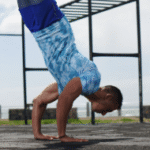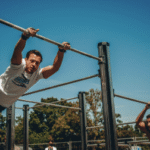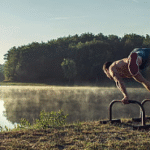The Mental Game: Psychology of Success in One-on-One Calisthenics
In the high-achieving, fast-paced environment of Houston, the pursuit of fitness is often approached with the same intensity as a major business deal. Yet, when it comes to a discipline as technical and demanding as calisthenics, physical effort alone is not enough. The journey to mastering your bodyweight is won or lost in the mind.
Generic apps and group classes can provide a workout, but they often fail to address the complex psychological barriers that lead to plateaus, frustration, and eventual burnout. This is where one-on-one calisthenics coaching reveals its true value. A great coach is more than an instructor; they are a psychologist for your physical potential, guiding you through the mental game. This guide details the critical psychological principles that a private coach helps you master for lasting success.
Pillar 1: Deconstructing Fear and Building Psychological Safety
For a beginner, looking at an advanced skill like a handstand or muscle-up can be incredibly intimidating. The mental game starts with overcoming the fear of failure and the fear of injury.
The Self-Taught Challenge: When you’re alone, the gap between where you are and where you want to be can seem like an unclimbable wall. This often leads to “analysis paralysis” (not knowing where to start) or attempting movements you aren’t ready for, leading to a negative experience or injury.
The Coach’s Solution: A private coach’s first job is to create a safe and non-judgmental space. They expertly deconstruct an intimidating goal into a series of small, manageable, and non-threatening steps. You won’t be “trying a handstand”; you’ll be practicing a “wall-facing plank” to build shoulder stability. This approach removes the fear and builds a foundation of psychological safety, allowing you to train with confidence rather than apprehension.
Pilar 2: Engineering Self-Efficacy – The Science of “I Can”
Self-efficacy—the unwavering belief in your own ability to succeed—is the single most powerful predictor of long-term fitness adherence. It’s not about blind optimism; it’s built on evidence.
The Self-Taught Challenge: Progress can be slow and hard to perceive on your own. Weeks can go by without a noticeable change, causing you to question if your efforts are even working. This doubt erodes motivation.
The Coach’s Solution: A coach is an architect of “engineered success.” They design a perfectly tailored program where “small wins” are built into every session. They track your progress meticulously, providing objective proof of your improvement:
“Last month, you couldn’t hold this for 10 seconds. Today, you held it for 30.”
“Notice how your hips aren’t sagging anymore? That’s a huge strength gain.”
This constant, data-driven feedback provides the evidence your brain needs to build genuine self-efficacy. You stop hoping you can do it and start knowing you can.
Pillar 3: The Accountability Framework – Beyond Push Notifications
In a demanding city like Houston, life will always provide a valid excuse to skip a workout. This is where the human element becomes non-negotiable.
The Self-Taught Challenge: An app’s push notification is impersonal and easily dismissed. The only person you’re letting down is yourself, and it’s easy to rationalize breaking that promise after a long day.
The Coach’s Solution: A private coach creates a powerful, multi-layered accountability structure.
The Scheduled Commitment: It’s an appointment in your calendar.
The Financial Commitment: You’ve invested your resources.
The Relational Commitment: This is the most potent layer. You build a professional rapport with your coach. They are invested in your journey, and you, in turn, are part of a team. This human connection creates a positive social pressure that an algorithm can never replicate.
Pilar 4: Reframing Failure – The Plateau as a Puzzle
Every serious athlete hits a plateau. The mental response to this moment is what defines long-term success.
The Self-Taught Challenge: A plateau feels like a personal failure. You think, “I’m not strong enough” or “I’ve reached my limit.” This negative self-talk is a motivation killer.
The Coach’s Solution: A coach reframes the plateau from a failure into a puzzle to be solved. They approach it with objective curiosity: “Okay, your muscle-up transition is stuck. Let’s analyze the video. It looks like your pulling power is solid, but your grip is slipping. Let’s dedicate the next two weeks to false grip conditioning.” This transforms a moment of frustration into a collaborative, strategic challenge, teaching you resilience and a growth mindset.
Pillar 5: Cultivating Focus – The Workout as a Mental Escape
Calisthenics demands an intense mind-body connection.
The Self-Taught Challenge: It’s easy to go through the motions, thinking about work emails or your commute on I-45 while you train.
The Coach’s Solution: A coach’s cues force you into the present moment. “Engage your core,” “Push the ground away,” “Feel your shoulder blades retract.” This intense focus is a form of active meditation. For the duration of the session, the outside world disappears. For a busy Houston professional, the workout becomes a powerful tool for stress relief and mental decompression, making it something you look forward to for its mental benefits as much as its physical ones.
Conclusion:
The mental game is the true arena of progress in calisthenics. While the physical work builds your muscles, the psychological journey builds your character. A one-on-one coach is your guide through this journey. They are your strategist for overcoming fear, your data analyst for building confidence, your accountability partner for ensuring consistency, and your mentor for cultivating resilience. They don’t just teach you how to move your body; they teach you how to change your mind.

The Mental Game: Psychology of Success in One-on-One Calisthenics
Route
Calisthenics Gym Houston Functional Bodyweight Training
Secondary phone: (346) 483-3195
Email: info@calisthenicsclubhouston.com
URL: https://calisthenicsclubhouston.com/
Monday 6:00 AM - 7:00 PM Tuesday 6:00 AM - 7:00 PM Wednesday 6:00 AM - 7:00 PM Thursday 6:00 AM - 7:00 PM Friday 12:00 PM - 6:30 PM Saturday 9:45 AM - 12:00 PM Sunday 3:00 PM - 5:00 PM





